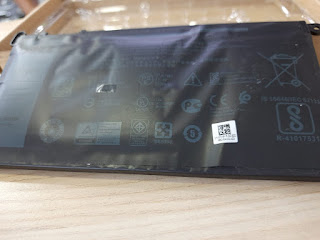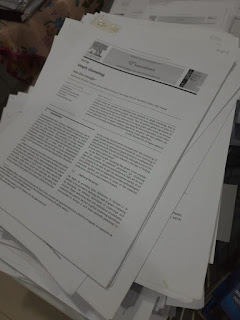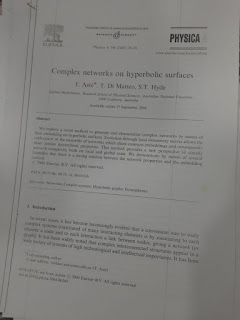This is one of the posts that I hesitated to put up because of associated stir of emotions and the possibilities of misunderstanding. Certain events may have prompted this post but let me say from the outset that it is not directed to anyone but merely expressing my thoughts on certain issues and how I think one should move on.
A biased opinion of mine: people tend to get too obsessed with labels. One can see this in all spheres of life. Labels have their beneficial purposes. They can be used in classifying things. For instance, how I group papers in my collection; on the coarsest level, I simply use how arXiv classify papers into their major groupings and thereafter I zoom into my own specific interests for the subgroupings. Such classification is not without problems; just as in arXiv, there will always be cross-listings and some may not even fit a particular class and may even evolve into their own groupings.
Life in general are even affected by labels (stereotypes); types of social groupings, cultures, political groups (one of the most revolting and divisive that I can see), understanding of religion and philosophy. On the last one, my readings on them are probably scanty, but that doesn't mean I'm static on the matter. I'm pretty much average (or to some, less than average) on religiosity. I had my religious awakening in the 80's and was buying plenty of religious books then, but I realised pretty early that I can't go far intellectually in religion without knowing enough Arabic. However, I read what I can, particularly now, when I'm on my last lap of life. I tend to keep this very much on the personal level and immediate family members and friends. Some will probably passed me off as being secular. I remembered participating in a colloquium between religious scholars and scientists in a university in the east coast. I overheard my presentation is said to be secular because of my slides do not contain any Qur'anic verses or prophetic sayings. The contents of my presentation (in Malay) can be found here (with links to earlier parts - whatever happened to the proceedings of the colloquium?). In fact, after my presentation, I overheard some ridiculed my pronunciation of the word 'mantiq' as man-tick (see this FB post). Perhaps, my hope that we can learn from each other at the time, was too idealistic (I did learn something from presentation of others; not sure what others think of mine).

This was not the only stint on religious scholars-scientists meet that I have participated in. Another one was at IIUM in Gombak (can't precisely remember when). Presented some similar ideas there and also my (personal) views on hidden variables, which surprised my scientist friend. I'm unsure of what the outcome of this event. In any case, I did air my (unpopular) views on philosophy in a small private discussion. Philosophy is great in uncovering hidden assumptions and I often seek if there's anything there that would help me progress in science (very much like mathematics). The downside for me, it is often too wordy for my liking and it conjures up labels to mark extreme positions for philosophical thoughts. These are rarely maintained (consistently) by a normal human. If I ever want to be imaginative, perhaps these extreme positions may be likened as pure states but generally one has mixed states in a convex geometry. The complex, rich human life tend to push humans for more contextual reasoning. If ever this is considered too flimsy, one may have to uncover some partial ordering in our thoughts leading to some hierarchy of priorities. Added note: Somebody once tried to put a label on me for what school of quantum theory that I adhere to, and he mentioned 'salafi' to which I was amused.
Finally, let me go to what led me to do this posting. By the Grace of God, my scientific life seems to fall in the domain (label) of mathematical physics (I would rather classed myself to be a theoretical physicist, being less rigorous). I remembered a story relayed by my late mum from a conversation during a journey to the Holy Land, mentioning the scientific area I am exploring for my studies and somebody (I figured he was an academic, but don't now who the person was) made the remark that this is a difficult area to go into for a Malay (another label) guy. My own experience when I first encountered the subject is the question why I have not been exposed to this earlier (completely off the radar) and part of my ambition as I came back home from my studies is to give more exposure for others to consider theoretical/mathematical physics as a domain of study. I'm not sure whether I have been successful in doing this but I do have a group of students under me that are now taking theoretical/mathematical physics for their academic career. I do still think, I have not done enough. For instance I wished that I had introduced quantum field theory and particle physics in our courses at UPM, but alas, there was very little that I can do then.
Now the label mathematical physics seems to be amphibious since it contains both mathematics and physics. Where do I belong? Well, I was a staff in Physics Department, but I graduated from School of Mathematical Sciences. How did I proceed? At some point, I was told that theoretical physics is not the main focus area of the department. So, when institutes were formed, and I had the impression that they tend to be interdisciplinary or multidisciplinary (the very least to be different from the departments), I joined the institute as a venue to pursue theoretical physics with a bigger aim and emphasis. At a later stage, I found myself in the maths institute. There I found myself to feel like how Penrose felt, "To a physicist, I am a mathematician; to a mathematician, a physicist" (see this video). I would take the stance of Penrose, but if I was pushed further for a definite answer, I would have to say I am a physicist because of my strong reliance on intuition (which is not really unique to physicists; mathematicians have them too).
Some might coarsely lumped mathematical physics as applied mathematics, to which I pointed out why did University of Cambridge have a Department of Applied Mathematics and Theoretical Physics (DAMTP). Roughly I do feel that they tend to have different tools of mathematics (and domains of physics) that they rely on but there's nothing sharp in their boundaries. Once, an international mathematician suggested to use physical mathematics, so that the basic domain (the second word that anchors the subject in English) remains to be mathematics (instead of physics). I tend to disfavour this (in fact it is not popular); to think mathematics as 'physical' seems 'odd'. Now there have been suggestions to use physical mathematics for 'different' subdomains. I have covered this in a talk I gave to undergraduate two years back. I don't think this idea caught on by the relevant community.

Does it matter what label do we use? This again, depends on the context. For me, it is always what scientific problem one is addressing and which community is considering such problems. In a way, it is a social construct but this does not mean anything goes. We have now a wealth of information and tradition to consider; what is valid, what is novel depends on the type of questions one is trying to answer. This is why I mentioned earlier, if pushed further, I would consider myself as a physicist. But that doesn't mean one can't pursue mathematics for its pure, general considerations (usually generalization and abstraction). These too, are of interest to physicists.
Perhaps a final thought on this: there is this tendency in the academia to put 'our ego' as primary concern. To me, this is harmful. I rather use Ghazali's classification of praiseworthy knowledge and blameworthy as a guide. Note that this does not quite pertain to the subject matter but more on the ethical dimension. Both physics and mathematics have the possibility to be blameworthy. May Allah guide us in our path in our pursuit of knowledge and render our knowledge beneficial to many.
































